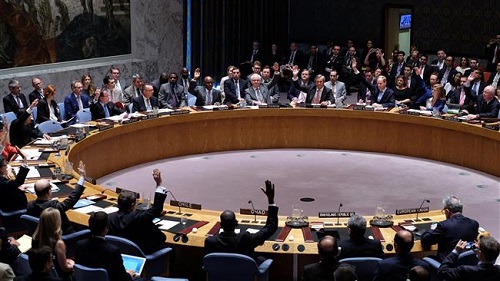The UN Security Council (UNSC) has unanimously endorsed a draft resolution turning into international law the Joint Comprehensive Plan of Action (JCPOA) reached between Iran and the P5+1 group of countries over the Islamic Republic’s nuclear program.
All 15 members of the UNSC voted for the draft UN resolution in New York on Monday, setting the stage for the lifting of Security Council sanctions against Iran.
“The draft resolution has been adopted unanimously,” announced New Zealand ambassador Gerard van Bohemen, whose country holds the current presidency of the UN Security Council.
The text of the draft UN resolution calls for the “full implementation” of the Vienna agreement “on the timetable established,” and urges UN member countries to facilitate the process. Press. TV reported.
Speaking following the vote, US Ambassador Samantha Power said calling for similar unity and collaboration in the face of other issues such as the suffering in Syria. “It should motivate us to do far more,” she added.
China’s Ambassador to the UN Liu Jieyi also welcomed the vote and called it “the first important step” toward implementing the deal reached in Vienna.
Iran and the P5+1 finalized the text of the JCPOA in the Austrian capital city of Vienna on July 14 after 18 days of intense negotiations and all-nighters that capped around 23 months of talks between Iran and the P5+1 – the United States, Britain, France, China and Russia plus Germany.
A vote for the sake of voting
The resolution will officially endorse the JCPOA, under which limits are put on Iran’s nuclear activities in exchange for a set of commitments by the P5+1, including the removal of all economic and financial bans against the Islamic Republic.
The UNSC vote is generally considered a formality, as all the five permanent members of the Council were partners to the negotiations with Iran and the JCPOA.
A moot mechanism
American officials have insisted on a mechanism for the so-called snapback of sanctions against Iran in case of Iranian noncompliance.
Based on the “snapback” mechanism, any single one of the six countries in the P5+1 can raise what it considers a breach of the JCPOA. The issue will then be taken up by a Joint Commission, which would assess the allegations in a period of 15 days. If its ruling fails to resolve the issue, the US or Iran can take the matter to an Advisory Board, which has another 15 days to issue a “non-binding opinion.” The Joint Commission will then have five days to consider the Advisory Board’s opinion, which makes the entire process as long as 35 days.
“If the resolution described… has not been adopted within 30 days of the notification [of the Joint Commission], then the provisions of the old U.N. Security Council resolutions would be re-imposed…”
This process cannot be interrupted except by a majority vote in the Security Council. Any of the five permanent members can, however, use its veto power to ensure that the sanctions resume.
Iranian officials have voiced opposition to the above mechanism.
Scott Bennet, a former US army psychological warfare officer and counter-terrorism analyst, told Press TV in an exclusive interview on Monday that the mechanism could be easily manipulated by certain countries in the P5+1 group.
He said that part of the agreement between Iran and the P5+1 group should guarantee that there would be no manipulation of the text into a “crisis situation where a certain party or a certain country can cry wolf and claim that there is some small infraction… and trigger a domino effect.”
“To avoid that, there needs to be an agreement that countries can evaluate infractions before any sort of a vote or decision can be made to determine if there even has been any infraction,” the Bennet said.
Also speaking to Press TV, Mohammad Taghi Hosseini, an expert in international affairs in Tehran, also told Press TV that it is not “to the benefit of the United States or to the benefit of any other party” to have the previous resolutions automatically re-imposed again “because there is a mechanism for it and the mechanism is not automatic.”
“So I do not believe that any wise politician, any wise decision maker would be in favor to break everything and also again going to the previous situation and re-imposing sanctions on Iran,” he said.
Netanyahu, his usual self
Meanwhile, hawkish Israeli Prime Minister Benjamin Netanyahu once again angrily reacted to the agreement between Iran and the P5+1.
In an interview with CBS on Sunday, he repeated his hackneyed mantra. “I think this is a very bad deal… It’s not good for anyone’s security.”
Even American officials have dismissed Netanyahu’s repetitive remarks about the JCPOA, sparing less and less attention to the comments as time goes by.
M. A.

